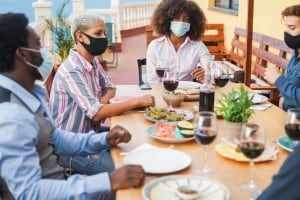One of the best gifts you can give this holiday season is the gift of health and safety.
As coronavirus cases continue to increase, it is important to avoid unnecessary travel and gatherings and to continue wearing masks, socially distancing and practicing good hand hygiene.
Take care of yourself and those you love this holiday season by following safety guidelines, eating well and seeking help if you feel sad or overwhelmed.
Surging COVID-19 cases are forcing many people to reconsider their holiday plans. However, that doesn’t mean you can’t enjoy the season safely even while limiting gatherings and travel.
“The numbers are concerning, and they continue to grow. It’s something we should all be aware of as we enter the holiday season,” said President and CEO Reginald Coopwood, MD. “We’re in a very concerning time. We can manage at this level, but if we have much more positivity and people becoming acutely ill, we will probably overrun our systems here locally.”
It raises tough questions: Should I move forward with my usual traditions? How can I keep stay safe? What if the whole situation is making me feel stressed and down?
Experts have answers to those questions and advice on having a rewarding holiday celebration without contributing to the spread of COVID-19.
Should I travel to visit extended family?
Unfortunately, the safe answer is no. Traveling and gathering with extended family and friends increases your chance of getting or spreading COVID-19.

President and CEO Reginald Coopwood, MD, implores residents to be safe this winter: “The numbers are concerning, and they continue to grow. It’s something we should all be aware of as we enter the holiday season.”
“The biggest recommendation this holiday season is that you don’t get together,” said Cyrilyn Walters, MD, medical director of ambulatory services, who sees patients in our Post COVID-19 Follow-up Clinic.
“Even if you plan to test multiple times before the gathering, it doesn’t change the risk of transmission and can give you a false sense of security.”
Dr. Walters said infected people who don’t yet have symptoms may not have enough viral load to record a positive test. However, they can still transmit the virus.
The Centers for Disease Control says avoiding travel is especially important in certain situations:
- You, a member of your household or someone you’re visiting is at increased risk for severe illness
- Cases are high or increasing in your community or destination
- Hospitals in your community or destination are overwhelmed
- You or people you’re visiting have had close contact with people outside the immediate household in the past 14 days
- Travel requires using a bus, train or airplane where it’s hard to stay 6 feet from others
Talk honestly with loved ones about the risk of travel. Dr. Walters’ advice is to celebrate with members of your immediate household and connect virtually with extended family and friends.
How can I stay safe if I do travel to see family?
If you do decide to travel, be sure to check travel restrictions and get your flu shot before you go.
Wearing a mask is crucial, Dr. Walters said. That includes any setting where you’re around people you don’t live with – inside a home, while using public transportation, in stores and gas stations, in hotel common areas, etc.

If you do gather with people outside your household, wear facemasks, try to stay outdoors and limit the number of guests.
The best masks have two layers of cloth and fit snugly over your nose, under your chin and on the sides of your face. Bring extra masks in case one gets lost or dirty. If you remove your mask to eat or drink, store it someplace where only you will touch it.
Be vigilant about staying 6 feet from anyone who doesn’t live with you, washing your hands and using hand sanitizer, and not touching your mask, eyes, nose and mouth.
While gathering with people outside your household is never completely safe, there are steps you can take to make it safer, according to the CDC:
- Bring your own food and dinnerware
- Limit the number of people in areas where food is prepared or handled
- Use single-use salad dressing and condiment packets and disposable dinnerware
- Eat outdoors or open doors and windows if possible
- Limit the number of guests
- Disinfect frequently touched surfaces and items between use
How can I cope with stress and sadness?
Health professionals realize their advice is a tough pill to swallow. They encourage everyone to find new ways to connect with loved ones and create positive memories this holiday season.
Schedule a virtual meal or arrange contact-free deliveries of your traditional dishes to local loved ones. If you live far apart, share favorite recipes and make the same meal.
Consider postponing big family get-togethers: with vaccines coming soon, you’ll give yourself something to look forward to by setting a date to safely celebrate in 2021.
Playing games, getting outdoors and talking about what you’re grateful for can lift your spirits. Try to make the most of time with your immediate family and seek help and support if you feel sad or anxious about what’s happening.
As always, take care of your physical health. Eating well, exercising and getting enough sleep can boost your overall mood and wellbeing.